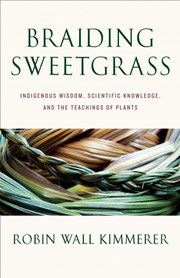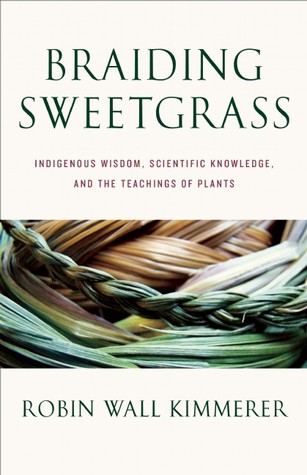Check nearby libraries
Buy this book

"An inspired weaving of indigenous knowledge, plant science, and personal narrative from a distinguished professor of science and a Native American whose previous book, Gathering Moss, was awarded the John Burroughs Medal for outstanding nature writing. As a botanist and professor of plant ecology, Robin Wall Kimmerer has spent a career learning how to ask questions of nature using the tools of science. As a Potawatomi woman, she learned from elders, family, and history that the Potawatomi, as well as a majority of other cultures indigenous to this land, consider plants and animals to be our oldest teachers. In Braiding Sweetgrass, Kimmerer brings these two lenses of knowing together to reveal what it means to see humans as "the younger brothers of creation." As she explores these themes she circles toward a central argument: the awakening of a wider ecological consciousness requires the acknowledgement and celebration of our reciprocal relationship with the world. Once we begin to listen for the languages of other beings, we can begin to understand the innumerable life-giving gifts the world provides us and learn to offer our thanks, our care, and our own gifts in return"--
"As a leading researcher in the field of biology, Robin Wall Kimmerer understands the delicate state of our world. But as an active member of the Potawatomi nation, she senses and relates to the world through a way of knowing far older than any science. In Braiding Sweetgrass, she intertwines these two modes of awareness--the analytic and the emotional, the scientific and the cultural--to ultimately reveal a path toward healing the rift that grows between people and nature. The woven essays that construct this book bring people back into conversation with all that is green and growing; a universe that never stopped speaking to us, even when we forgot how to listen"--
Check nearby libraries
Buy this book

Subjects
Botany, Ecology, Potawatomi Indians, Indian philosophy, Philosophy of nature, Human-plant relationships, Effect of human beings on, Nature, Indigenous peoples, Philosophy, Social life and customs, Human ecology, Biography, SCIENCE / Life Sciences / Botany, SOCIAL SCIENCE / Ethnic Studies / Native American Studies, NATURE / Essays, NATURE / Plants / General, Nature, effect of human beings on, Indians of north america, middle west, Indians of north america, social life and customs, nyt:paperback-nonfiction=2020-02-09, New York Times bestseller, Ethnoecology, North American Indians, Brauchtum, Indianer, Indigenes Volk, Lokales Wissen, Natur, Naturphilosophie, Ökologie, Potawatomi, Weisheit, Indians of North America, Essays, Plants, General, Science, Life Sciences, Philosophie autochtone, Ethnoécologie, Philosophie de la nature, Écologie humaine, Philosophie, Homme, Influence sur la nature, Relations homme-plante, Botanique, Potéouatamis, Biographies, Moeurs et coutumes, Philosophie indienne d'Amérique, Potawatomi (Indiens), Mœurs et coutumes, Livres numériques, Indiens d'Amérique, E-books, SOCIAL SCIENCE, Discrimination & Race Relations, Minority Studies, Naturverständnis, Botanik, Electronic books, the great longing, hope, Indigenous women, Indigenous people, Indigenous knowledge, Indigenous knowledge - Health and medicine, Indigenous knowledge - World view, Indigenous knowledge - Ecology, wisdom, Sacred books, Sacred space, Sacred songs, Sacred texts, Modern Philosophy, Philosophy and aesthetics, Ancient Philosophy, Sociolinguistics, Religion and sociology, Sociology of Knowledge, Socioeconomic Factors, The Holy, holy spirit, Spirituality, Spiritual life, Spiritualism, Spiritual healing, Religion & Spirituality, New Age / Body, Mind & Spirit, Spiritual Gifts, BODY, MIND & SPIRIT / Nature Therapy, Roots, Roots (Botany), Ancestry, English language, Language and languages, Language, American indigenous languages, Languages, North & Central American indigenous languages, Indigenous languages, biocentrism, Social sciences, Earth sciences, Herbs, Herbicides, Herbals, Herb gardening, Environmental protection, Gardening, rivers, water, sea, land, landscape, Emigration and immigration, Immigrants, United states, emigration and immigration, Women immigrants, immigration, Origin of species, origin stories, Genesis, Bible, Biblical teaching, Bible, study and teaching, Bible, criticism, interpretation, etc., English Bible stories, Women in the Bible, Ancient History, Ancient Geography, Sweetgrass baskets, sweetgrass, arbres, écosystème, écologie, foin d'odeur, cercle de vie, cercle de vie et de mort, économie de subsistance, économie de don, peuples indigènes, droits des indigènes, indigènes américains, terre, sol, pacanier, spiritualité, sociologie, civilisation, primitivisme, méthode scientifique, science indigène, mouvement environnemental, justice sociale, activisme, climat, environnement, espoir, sagesse indigène, fruits, règne végétal, règne animal, animaux, unité, fraises, générosité, matriarcat, terre mère, tressage, féminisme radical, féminisme, droits des femmes, libération des femmes, économie du don, cadeau, matrifocalité, soins, réciprocité, vie, vie végétale, relations homme-environnement, relations femmes-environnement, baies, racines, économie, culture des marchandises, capitalisme, culture, critique de la culture, anticapitalisme, humanité, empathie, solidarité, communauté, soins de proximité, résistance, communisme, propriété privée, économie de marché, justice, politique, histoires, histoire, histoire indigène, histoire des amériques, tabac sacré, tabac, rituels sacrés, langue indigène, langue, laguages, langues oubliées, botánica, hierba sagrada, Hierbas medicinales y aromáticas, Hierbas, Hierbas medicinales y aromaticas, naturaleza, medio ambiente, ecología, sociología, naturaleza humana, seres humanos, relaciones hombre-animal, tierra, suelo, plantas, animales, vida vegetal, vida, fresas, nueces, comunicación vegetal, lenguaje, ciencia, lenguaje de las plantas, lenguaje de la ciencia, lenguaje científico, culturas, culturas indígenas, indígenas americanos, américas, relaciones mujer-animal, mujer, Mujeres, derechos de la mujer, madre tierra, trenzado, necesidades indígenas, clima, activismo, cuidado, economía, economía del cuidado, economía del regalo, matrifocalidad, matriarcado, feminismo, feminismo radical, reciprocidad, regalo, gratitud, esperanza, lengua indígena, comunidad, comunidades indígenas, américa del norte, américa del sur, descolonización, colonización, movimiento poscolonial, colonialismo, pecas, árboles de nuez de peca, tabaco, tabaco sagrado, Historia sagrada, Textos sagrados, Oratoria sagrada, Sagrada Familia, Espacio sagrado, Libros sagrados, Lugar sagrado, lo sagrado, bendición, bendecido, Acción de Gracias, espiritualidad, cultivos, conocimiento, conocimiento sagrado, orígenes humanos, conexión con la tierra, ecosistema, ecofeminismo, Eingeborene, Indigene Frau, Indigene, Indianersprachen, Nordamerikas indianer, Indianerin, Indianerpolitik, Eingeborene Sprachen, Sprache, Spachen, Umwelt, Umweltschutz, Umweltpolitik, Umweltethik, Umweltökonomie, Umweltbezogenes Management, Wissenschaft, Wissenschaftstheorie, Politische Wissenschaft, Wissenschaftliches Arbeiten, Wissenschaftsphilosophie, Wissenschaftler, Eingeborenes Wissen, Wissen, Wissenssoziologie, Süßgras, Gesellschaft Soziologie, Soziologie, Soziologie, Gesellschaft, Gesellschaft, Amerikanisches Englisch, Amerika, Nordamerika, Amerikas, Flechten, Körbe flechten, Mutter Erde, Erde, Pflanzen, Tiere, Tierwelt Pflanzenwelt, Pflanzenwelt, Tierwelt, Pflanzenökologie, Pflanzenschutz, Pflanzengesellschaft, Pflanzenwachstum, Bedrohte Pflanzen, Tierethik, Tierschutz, Tierrecht, Sprachphilosophie, Ethik, Gesellschaftskritik, Ökosystem, Politische Ökonomie, Ökologische Bewegung, Wirtschaft, Wirtschaftspolitik, Wirtschaftstheorie, Wirtschaftsethik, Wirtschaftsgeschichte, Wirtschaftsbeziehungen, Wirtschaftssystem, Wirtschaftssoziologie, Geschichte, Kolonie -- Spanien -- Amerika -- GeschichtePeople
Jane Goodall (1934-), The Guardian, Potawatomi Tribe, Aldo Leopold (1886-1948), Seattle Chief (1790-1866), Janine Benyus, George Washington Carver (1864?-1943), Henry David Thoreau (1817-1862), John Muir (1838-1914), Charles Darwin (1809-1882), Carl Linnaeus (1707-1778), Francis of Assisi, Saint (1182-1226), The Peacemaker, Skywoman, Francis of Assisi, Saint (1182-1226)Showing 1 featured edition. View all 16 editions?
| Edition | Availability |
|---|---|
| 1 |
aaaa
Libraries near you:
WorldCat
|
Book Details
Classifications
ID Numbers
Source records
marc_openlibraries_sanfranciscopubliclibrary MARC recordLibrary of Congress MARC record
Better World Books record
Promise Item
marc_columbia MARC record
marc_columbia MARC record
marc_columbia MARC record
Internet Archive item record
amazon.com record
harvard_bibliographic_metadata record
Work Description
As a botanist, Robin Wall Kimmerer has been trained to ask questions of nature with the tools of science. As a member of the Citizen Potawatomi Nation, she embraces the notion that plants and animals are our oldest teachers. In Braiding Sweetgrass, Kimmerer brings these lenses of knowledge together to show that the awakening of a wider ecological consciousness requires the acknowledgment and celebration of our reciprocal relationship with the rest of the living world. For only when we can hear the languages of other beings are we capable of understanding the generosity of the earth, and learning to give our own gifts in return.
Links outside Open Library
Community Reviews (0)
Feedback?| September 26, 2024 | Edited by MARC Bot | import existing book |
| April 13, 2024 | Edited by | Merge works |
| March 4, 2024 | Edited by DGRGermany | Edited without comment. |
| March 4, 2024 | Edited by DGRGermany | Edited without comment. |
| June 23, 2014 | Created by heyup | Added new book. |














